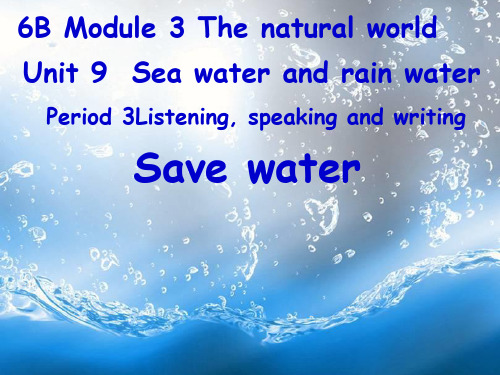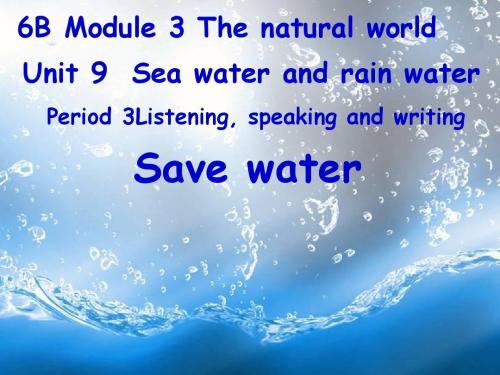牛津上海版英语六年级第二学期 Unit9 Sea water and rain water知识点精讲
- 格式:docx
- 大小:23.68 KB
- 文档页数:10






Unit 9 Sea water and rain water(一)知识与技能1熟练掌握use sth. for doing sth. / We use water for showering. / We use water for cooking. 2If… will…复合句的掌握,结合阅读的材料进行操练。
单元难点3掌握句型:How can we use water?We can use water by doing sth.4介词for 的用法(后跟一段时间); 介词by, under的用法5重点掌握情态动词can表达建议的用法。
(二)过程与方法1、6B 中已出现了use water to do sth.,本单元介绍了此句型的另为一种表达方式:use water for doing sth., 教师可以从use…to do.. 引出use … for doing用法。
2、学习if… will…的复合句,要加强操练。
学生对复合句的用法不很熟练,应设计各种情景,强化此句型的操练,以达到熟练运用。
3、新的句型:we can save water by doing sth.学生在接受时会遇到困难,应该多加以机械操练。
4、复习祈使句,Fixing dripping taps. Turn dripping taps off.本单元继续加强。
5、Have you ever seen…? 的句型在6A,6B中都已出现,但作为知识难点,教师在学习过程中还要再复现与强调。
(三)情感、态度、价值观1、了解海洋生物,比如:a coral reef, seaweed, dolphin, shark, intelligent.2、认识到水的珍贵和学会如何节约用水Period1Language focus:1. Asking ‘How' questions to find out specific information about an event.2. Using the simple present tense to talk about present states.Teaching aims:1. Introducing the way to express ‘How do we use water We use water to …' and understand the importance of water.2. Providing chances for the students to improve the skills of listening, speaking, reading and writing.3. Maintaining the student's ability to advertise the importance of water. 重点Teaching aids:1. Cassette 6B and a cassette player2. Some pictures about water3. TV and video camera4. Cups and drinks5. Materials for making postersTeaching procedures:I. Warming up:The students read a poem titled “Water all around us”II. Pre-task preparation1. To introduce the new lesson Using Water, I would invite students to taste 3 different types water-related liquids and guess what they are.2. The students will listen to the tape and repeat after it.3. The students will work in groups and then be given a few words on paper to create sentences with by putting them in the correct order. This will create the main question: How do we use water We use water to …4. They will read these sentences, a way for them to get an impression of the key phrases: How do we use water We use water to…III. While-task procedure1. The students will be shown some slides about the use of water and read the phrases on the slides.2. The students will then get into pairs to ask and answer each other's questions like this: How do we use water We use water to…(referring to the slides)3. The students play charades. One will perform a silent action to do with water and a pair of students will ask each other by using the structure:How do we use water We use water to …IV. Post-task activity1. The students will be shown a picture and learn that we should save water.2. The students will choose between making a poster, a short dialogue or writing some slogans for “Water Day”.3. The students will present their work to the whole class.V. Assignment1. Continue to prepare for the presentation on Water Day.2. Read the text after the recording3. Complete Workbook page 254. Write a short report on various ways of using water and give suggestions for saving water.Period 2Oral practiceText1.Learn: wood, charcoal, gas, electricity by pictures.2. Introduce: I like to cook with …I like …because …what do you like to cook with Why do you like to …and read the story to the students.3.Ask: What does Ben / Kitty like to cook with Why What does Ben / Kitty like better Why Ask: Who are they Where did they live …4. Recording: Read a story. Follow---Listen---Repeat5. Ask studentss to tell the story about Stone Age People by making use of the wallpictures.6. Finish T/ F individually. Read aloud and correct.7. Finish the book report.8. Read the book reports aloud.9. Collect them for marking.Homework:WB page 27 ,29 GB pageRead and recite the words and phrases and the text.Period 3Oral practiceText1. Learn: fire-warning, low, high, extreme. This is a …The fire danger is …2. Reviews:3. Recording: follow --- listen --- repeat. Ask: What does Ben like to cook with Why What does Grandma Wang like to cook with Why What does Kitty like to cook with4.Do pairwork, then role-play5. Show eight signs, ask What does this mean Write the correct answer under each sign6. Recording: follow ---listen ---repeat7. Play a game. Learn fire-safety, must, mustn’t, poster8. Read the text and act it out.9. Listen and draw.Homework:.Read and recite the words and phrases and the text.WBpage30 GB page 51Period 4Oral practiceText1. Show the poster: What else did Mark’s father sayHe said we must not smoke.2. Recording: follow ---listen ---repeat.3. The fire rules in our school: we should / must / mustn’t…4. Recording: follow --- listen --- repeat5. Photocopiable pages 6, 7. look at pictures and write the rules. Match the cut-out pictures with the rules.6. Write a rule on the board and draw the apprepriate picture.7. Listening test: page 25Homework:Recite the pastGB8Read and recite the words and phrases and the textNOTES: (单元教后记)1、本单元难点If… will…复合句的掌握,重点句型:How can we use water?We can use water by doing sth.。
U9 Sea water and rain water知识点精讲及巩固提升练习 一、重点单词 序号 英文 音标 词性 中文 1 /'stɑːfɪʃ/ n 海星 2 /siː ' hɔːs/ n. 海马 3 /ˌkɒmpəˈtɪʃn/ n 竞赛;比赛 4 /striːm/ n 小溪;河流 5 /weɪl/ n 鲸 6 /'dɒlfɪn/ n 海豚 7 /ʃɑːk/ n 鲨鱼 8 /ɪn'telɪdʒ(ə)nt/ adj 聪明的 9 /'fɪʃəmən/ n 渔夫 10 /ɪm'pɔːt(ə)nt/ adj 重要的 11 /'kʌvə/ v 覆盖 12 /'ɪntənet/ n 互联网 13 /'ʃaʊə/ n 淋浴 14 /krɒp/ n 农作物 15 /'fɑːmə/ n 农场主;农夫 16 /'drɪpɪŋ/ adj 滴水的 17 /tæp/ n 龙头 18 /'rʌnɪŋ/ adj. 流动的 19 /weɪst/ v 浪费 20 /fɪks/ v 修理 21 关掉 22 代替
二、重点短语 地球的四分之三
四分之一的…. 生活在小溪里 在地球上 海洋生物 地球上最大的动物 地球上最聪明的动物之一 ‘‘最……的之一” 在海洋中 从海洋中获取食物 用网抓鱼
用…做… 对……很重要
对……不重要 使…保持干净 停止污染它们 停止做正在做的事 停下来去做另一件事 …的答案 我们将会没有水喝 洗澡 洗盘子 需要某物做某事 在他们的农场上 节约用水
省钱 通过修理滴水的水龙头 用…….的方式 三、重点句型 1. 几乎地球的四分之三是水。 2. 许多鱼类和海洋动物生活在地球上的小溪、河流、湖泊、海洋。 3. 鲸鱼是地球上最大的动物。 4. 海豚是最聪明的动物之一。 5. 渔民在深海用网捕鱼和捕虾。 6. 我们必须停止砍伐森林。 7. 如果没有雨,我们将没有水喝。 8. 农民需要水来浇灌他们农场的庄稼和蔬菜。 9. 我们可以通过修理漏水的水龙头来节约用水。
四、重点词性转换: 原词 可能的变形
1. competition ( n.)竞争;比赛 ____________ (v)竞争;竞赛,比赛 ____________ (n)竞争者 2. intelligent adj.聪明的 ____________ (n.)智力,智能 3. important adj.重要的 ____________ (n.)重要性
____________ (adj.)不重要的 4. shower (v.)淋浴 (n. )淋浴 ____________ (v.)展示 5. cover (v.) 覆盖 (n.) 封面 ____________ (v.) 去除...的封面 ____________ (v.) 发现 ____________ (n.) 发现 6. drip (n,)水滴 (v.)滴下 ____________ (adj)滴水的 巩固提升
I. Filling in the blanks.(写出下列中英文) 1. Making money is hard work. Don’t _____________ it. /ˈweɪstə/ 2. Happy farmland is a game which players can grow _____________. /krɒps/ 3. I’d like to find some information about water on the _____________. /'intənet/ 4. Knowing something about sea animals is very ___________. /ɪmˈpɔ:tnt/ 5. Danny is an _____________ boy in our class. /ɪnˈtelɪdʒənt/ 6. There is a beautiful_____________ between two mountains. /stri:m/ 7. About three quarters of the Earth is _____________ with water. /ˈkʌvəd/ 8. The _____________ show in Shanghai Wild Animal Park is very popular. /ˈdɒlfɪn/ 9. Our school canteen ________ lunch for us.[prəˈvaɪdz] 10. Many ________ make their homes in the ________ of the trees. ['ɪnsekts] ['hɒləʊz] 11. As we all know, a ________ is a large ________ of trees. [ˈfɒrɪst] [ˈeəriə] 12. Some foreign visitors are learning to use__________ . /'tʃɔpstiks/ 13. We need some new__________for our new flat. /'fə:nitʃə(r)/ 14. I like the clothes which are made of__________. /'kɔtn/ 15. The__________chair from IKEA is very fashionable. /'wudn/
II.Choose the best answer(选择最恰当的答案) 1. We can save water by not washing vegetables _________a running tap. A. at B. on C. in D. under 2. You must fix the ________ tap. A.drip B. dripped C. dripping D. drips 3. Whales are _________ animals on the Earth.. A. the large B. largest C. the largest D. the most large 4. There is only ___________ drinking water in the world. A. little B. a little C. few D. a few 5. Can we get food _________the oceans? A. to B. from C. for D. away 6. _________ can we do to save the world? A. What B. Where C.Which D. Who 7. If I _________ time, I __________ to see you. A. have; go B. have; will go C. will have; go D. will have; will go 8. Please turn _________ the TV. Tommy is doing homework. A. on B. off C. of D. to 9. We should not waste water in our daily life. How to pronounce the underlined part? A./ eɪ / B. / ɪ / C. / aɪ / D./ e / 10. Firemen need water _________out fires. A. to put B. for put C. put D. putting 11. Which sea animals do you like ___________, starfish or sea horses? A. better B. best C. many D. most 12. __________ important information it is! A.What B. What an C. How D. How an 13. Here is a quiz __________ a school competition about water. A. with B. for C. to D. on 14. What _________ important part water plays in our daily life! A. a B. an C. the D. / 15. There _________ a new supermarket near our housing estate in a year. A. has B. have C. will have D. will be 16. We’ve got a lot of information about the topic. __________ very useful. A. They are B. It is C. They do D. It does 17. Mary was ill, so Peter went to have a meeting ___________ her A.before B. instead of C. in front of D. because 18. We can save money __________ snack. A.not to buy B. not buying C. by not buying D. not by buying 19. __________ English is important ___________ everyone of us. A.Learning; to B. Learning; for C. Learn; to D. Learn; for 20. A quarter of these apples __________ too much for me. But three quarters of the water ________ not too much.
A.is; is B. are; is C. is; are D. are; are
III.Fill in the blanks with the words in their proper forms (用所给词的适当形式填空) 1. There are some _____________working in their farms. (farm) 2. I’m too hot. I want to take a _____________(show). 3. It is _______________ to learn English well. (importance) 4. Dolphins are _______________ sea animals. (intelligence) 5. The books are quite________________(interest). 6. Eddie won a first prize in the reading ____________. (compete) 7. My father is a ____________. He likes fishing very much. (fish)